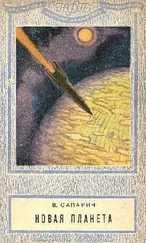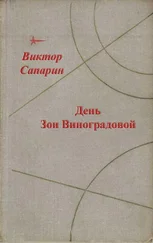Виктор Сапарин - The Trial of Tantalus
Здесь есть возможность читать онлайн «Виктор Сапарин - The Trial of Tantalus» весь текст электронной книги совершенно бесплатно (целиком полную версию без сокращений). В некоторых случаях можно слушать аудио, скачать через торрент в формате fb2 и присутствует краткое содержание. Жанр: Фантастика и фэнтези, на английском языке. Описание произведения, (предисловие) а так же отзывы посетителей доступны на портале библиотеки ЛибКат.
- Название:The Trial of Tantalus
- Автор:
- Жанр:
- Год:неизвестен
- ISBN:нет данных
- Рейтинг книги:5 / 5. Голосов: 1
-
Избранное:Добавить в избранное
- Отзывы:
-
Ваша оценка:
- 100
- 1
- 2
- 3
- 4
- 5
The Trial of Tantalus: краткое содержание, описание и аннотация
Предлагаем к чтению аннотацию, описание, краткое содержание или предисловие (зависит от того, что написал сам автор книги «The Trial of Tantalus»). Если вы не нашли необходимую информацию о книге — напишите в комментариях, мы постараемся отыскать её.
The Trial of Tantalus — читать онлайн бесплатно полную книгу (весь текст) целиком
Ниже представлен текст книги, разбитый по страницам. Система сохранения места последней прочитанной страницы, позволяет с удобством читать онлайн бесплатно книгу «The Trial of Tantalus», без необходимости каждый раз заново искать на чём Вы остановились. Поставьте закладку, и сможете в любой момент перейти на страницу, на которой закончили чтение.
Интервал:
Закладка:
... Now he saw Charlie through a haze. His friend looked straight at him as if this time he actually did see him. Then he stepped forward, and Barch saw that this was really Charlie and not his image on the screen.
"At last!" he heard Charlie say. "What's wrong with your leg?"
Barch tried to speak but the words would not come.
"I've searched the whole Pacific," Charlie was saying. "We were afraid you might have been carried beyond the island. The machine didn't confirm landing. It only radioed that it had dropped you and gave the wrong bearings. It burned up in the air."
Barch waited until Charlie's face emerged from the haze and his voice sounded distinct. Mustering all his strength, he shouted: "Tantalus... and the elephant virus, it's the same thing. The one from the Amazon..."
V
Tradition demanded that all parties concerned be present in the courtroom. By the same unwritten laws both the defence and the prosecution always wore black. Historians maintained that this custom dated back to the remote times when human beings were put on trial and the judges garbed themselves in black robes.
At last the day of the trial came.
As usual, no speeches were delivered. Only a brief outline of the case was given to refresh the memories of those present. The luminescent cupola of the circular hall darkened, the walls vanished and the spectators were transported, as it were, to the heart of a primeval forest on the banks of the Amazon River. Giant trees reared up on all sides, their branches intertwined above to form a green tent overhead. Birds flew from branch to branch right above the heads of the hushed audience, filling the air with their shrill cries. The hall, or rather its floor, was now a sort of island floating in the midst of a green ocean. Now the island began to move slowly through the impenetrable jungle which closed behind it. Presently the jungle thinned and a body of water appeared only to be hidden almost at once by tall stands of bamboo. Now the spectators were surrounded by whispering bamboo thickets, their fluffy crowns nodding in the breeze. A creaking sound caused all heads to turn in one direction-the bamboo stalks parted and a tall man with a face bronzed by the sun appeared. He cut off several green stalks with a machete and held them out towards the audience.
An enormous hand appeared in the air and took the stalks. In an instant the forest vanished and the spectators found themselves in a laboratory equipped with a large number of automatic researchers. Closer examination revealed that this was not one but six identical laboratories.
For the convenience of the spectators the picture was shown in several parts of the hall at once. In the middle of six huge circles, flashed simultaneously onto the ceiling of the hall, there appeared six identical and greatly magnified reproductions of Tantalus-1, as the common ancestor of all the Tantalus viruses was now called. All six Tantaluses jerked and wriggled in unison, as if they were performing calisthenics in some fantastic parade. It was indeed a sort of parade. One Tantalus followed another down to the last, Tantalus-10, recently discovered on the Solomon Islands.
The evil deeds of the criminals were then demonstrated.
The spectators were shown the withered plants on the sugar plantations of Jamaica, the African elephants sprawled listless on the ground.
"It is not only a matter of elephants," said the commentator, "but of Ngarroba's experiments."
Barch, of course, knew about this experiment. It had been the subject of much discussion. Ngarroba had found the well-preserved remains of a mammoth in the Siberian permafrost belt and had been able to revive some of its cells, including the reproductive cells. He had used the latter to impregnate twenty female elephants from the African preserve. If his experiment succeeded and the hybrids were obtained, he intended to use the same artificial method on the second generation whose offspring would then be three-quarters mammoth. The fourth generation would produce "pure bred" mammoths with a negligible admixture of "foreign" blood. It was Ngarroba's idea to setde these mammoths in the Antarctic, the only part of the world where the animal world was still poor.
And now the Tantalus had ruined his first experiment. Even if he began all over again there would be one generation of mammoths less.
"For that alone it deserves to be wiped out," remarked the man next to Barch.
But this was not the only crime Tantalus had committed. There followed a series of impressive figures: thousands of tons of ruined sugar-cane and other raw materials; human time and energy wasted in connection with the quarantines necessitated in many districts by the advent of the Tantalus, and so on. The ubiquitous virus had cost mankind dearly.
"But the Tantalus is not only harmful," said the commentator. "In all justice it must be said that it can be useful too, very useful indeed. It has been established that it facilitates the growth of plants. Even sugar-cane in the first period of infection showed a rapid increase in growth though later the growth ceased and the plant perished. On bamboo plants, however, one of the varieties of Tantalus, No. 4, has a remarkable effect. Bamboo is noted for its rapid growth, but in this case the process is speeded up to an amazing degree. Moreover, the fibre becomes stronger and more resilient. For all art work Tantalus bamboo is now considered the best."
Barch waited impatiently for the commentator to come to the problem on whose solution he had devoted so much energy.
And at last it came:
"Tantalus-1 lived quietly and peacefully in the upper reaches of the Amazon River until man, whose activity has now extended to every corner of this planet, reached these formerly unexplored regions. He cut clearings in the jungle and the sunlight poured in. As time went on, the advent of dams, cities and factories brought to these parts numerous chemical substances which Tantalus-1 had never encountered previously. It proved particularly sensitive to some of them-not only to manganese which produced Tantalus-3, but even to ordinary lime. A rapid change of form and characteristics began.
And now the fate of the virus was about to be decided. What was to be done with it?"
"Clap it in gaol," said Barch's neighbour, "and at once. Isolate it the way you would a madman whose actions no one can predict."
"What!" cried Svensen. "Imprison a virus with so many positive characteristics? That would be madness if you like!"
"Hear! Hear!" said another member of the gathering. "Why should we throw away the opportunity to speed up plant growth, or obtain a higher grade bamboo?"
"And ruin our sugar-cane and poison our elephants," someone added caustically from the other end of the hall.
"We already have effective means of combating Tan-talus-2 and Tantalus-3."
"Yes, but who knows what Tantalus-11 may bring?" As usual everyone was eager to express his opinion.
But the most vehement was Svensen.
"If we cut short Nature's experiment," he said, "we deprive ourselves of knowledge it may take our laboratories ten or twenty years to acquire."
"What are more important: human beings or microbes?" objected the representative of the Planning Bureau. "What has nature got to do with the case? After all, the new activity of Tantalus is the virus's reaction to man, not nature. It lived in nature thousands of years without raising its head. No, this is a downright revolt against man, against mankind and his works..."
"You're forgetting the bamboo!" someone cried.
"Rather too high a price to pay for bamboo!"
Several people pressed their chair buttons at once asking for the floor. The dispatcher could barely keep pace with the demand. At the height of the discussion, w7hen about a dozen tiny lamps had flashed on the dispatcher's panel, Karbyshev's voice sounded.
Читать дальшеИнтервал:
Закладка:
Похожие книги на «The Trial of Tantalus»
Представляем Вашему вниманию похожие книги на «The Trial of Tantalus» списком для выбора. Мы отобрали схожую по названию и смыслу литературу в надежде предоставить читателям больше вариантов отыскать новые, интересные, ещё непрочитанные произведения.
Обсуждение, отзывы о книге «The Trial of Tantalus» и просто собственные мнения читателей. Оставьте ваши комментарии, напишите, что Вы думаете о произведении, его смысле или главных героях. Укажите что конкретно понравилось, а что нет, и почему Вы так считаете.



